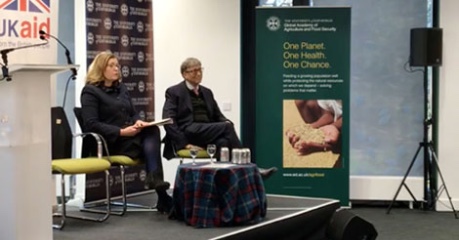Tuesday 10th April 2018, 3:00pm
How CRISPR could transform global development - by Bill Gates
Gene editing to make crops more abundant and resilient could be a lifesaver on a massive scale.

In January, Bill Gates visited the The University of Edinburgh Easter Bush Campus, where he met with scientists associated with the Centre for Tropical Livestock Genetics and Health and was introduced to advanced genomic research to help farmers in Africa breed more productive chickens and cows.
Article published in Foreign Affairs, April 10th 2018.
"Earlier this year, I traveled to Scotland, where I met with some extraordinary scientists associated with the Centre for Tropical Livestock Genetics and Health at the University of Edinburgh. I learned about advanced genomic research to help farmers in Africa breed more productive chickens and cows. As the scientists explained, the breeds of dairy cows that can survive in hot, tropical environments tend to produce far less milk than do Holsteins—which fare poorly in hot places but are extremely productive in more moderate climates, thanks in part to naturally occurring mutations that breeders have selected for generations.
The scientists in Scotland are collaborating with counterparts in Ethiopia, Kenya, Nigeria, Tanzania, and the United States. They are studying ways to edit the genes of tropical breeds of cattle to give them the same favorable genetic traits that make Holsteins so productive, potentially boosting the tropical breeds’ milk and protein production by as much as 50 percent. Conversely, scientists are also considering editing the genes of Holsteins to produce a sub-breed with a short, sleek coat of hair, which would allow the cattle to tolerate heat.
This sort of research is vital, because a cow or a few chickens, goats, or sheep can make a big difference in the lives of the world’s poorest people, three-quarters of whom get their food and income by farming small plots of land. Farmers with livestock can sell eggs or milk to pay for day-to-day expenses. Chickens, in particular, tend to be raised by women, who are more likely than men to use the proceeds to buy household necessities. Livestock help farmers’ families get the nutrition they need, setting children up for healthy growth and success in school.
Similarly, improving the productivity of crops is fundamental to ending extreme poverty. Sixty percent of people in sub-Saharan Africa earn their living by working the land. But given the region’s generally low agricultural productivity—yields of basic cereals are five times higher in North America—Africa remains a net importer of food. This gap between supply and demand will only grow as the number of mouths to feed increases. Africa’s population is expected to more than double by 2050, reaching 2.5 billion, and its food production will need to match that growth to feed everyone on the continent. The challenge will become even more difficult as climate change threatens the livelihoods of smallholder farmers in Africa and South Asia.
Gene editing to make crops more abundant and resilient could be a lifesaver on a massive scale. The technology is already beginning to show results, attracting public and private investment, and for good reason. Scientists are developing crops with traits that enhance their growth, reduce the need for fertilizers and pesticides, boost their nutritional value, and make the plants hardier during droughts and hot spells. Already, many crops that have been improved by gene editing are being developed and tested in the field, including mushrooms with longer shelf lives, potatoes low in acrylamide (a potential carcinogen), and soybeans that produce healthier oil.
For a decade, the Bill & Melinda Gates Foundation has been backing research into the use of gene editing in agriculture.